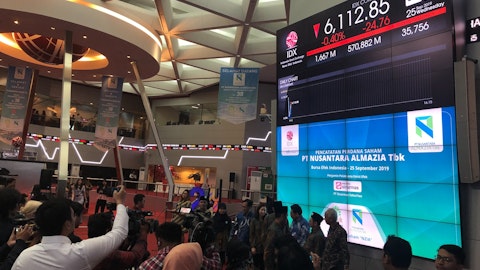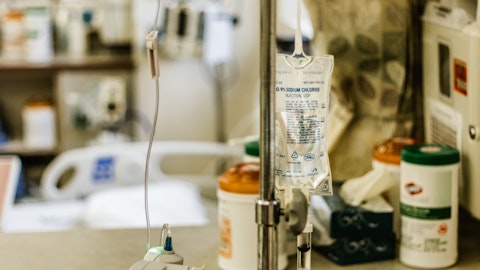Raffi Asadorian: Yes. So as mentioned, the majority of those DSUVIA sales on which we earned revenues was read to the DoD. And given that Alora is still transitioning, we are working on the transition with them. We would expect that to be for the third quarter, pretty similar because they’re just now as we mentioned, they’re finishing up their training in the third quarter. They’re continuing that transition and then the renewed kind of activities on the commercial front on their end, probably going to begin sometime in the fourth quarter. So I would expect DoD sales to be the primary driver this year of our royalty revenues. And I think, as Vince mentioned, there’s a lot of activities going on with the DoD. So hopefully, it’s consistent and growing. But again, we’re not controlling outside of that – those revenues. But we do expect Alora will be ramping up by the end of this year in terms of commercial activities.
Thomas Yip: Got it. Thank you. Perhaps one more question from us on Fedsyra. Regarding the regulatory progress, can you help what are the major steps? You mentioned approval expected in 2024? What are the major moving parts that are still ongoing to get to that point?
Vince Angotti: Yes. We pretty much completed that project as it relates to readiness for the NDA, so we’ve got the package prepared. It will be a matter of paying the PDUFA fee and submitting it through their electronic portal. As we mentioned, we try to continue stressing Niyad is the absolute priority for us. And we’re trying to pull every lever we can with the resources available to us to be able to expedite that study in any way, shape or form, whether it’s the clinical trial materials or some other mechanism. We still plan to submit the Fedsyra application before the close of this year. But we want to keep that flexibility of our resources available to expose any possibility to continue to accelerate Niyad. So the simple answer to your question, Thomas is we’re ready for that one. It’s all about doing everything we can to accelerate the movement in investment on Niyad.
Thomas Yip: Got it. Thank you. Thank you for taking our questions and definitely looking forward to the EUA decision on Niyad this year.
Vince Angotti: Yes. Us as well. Thank you, Thomas.
Operator: The next question comes from Jim Molloy of Alliance Global. Please go ahead.
Laura Suriel: Hello. This is Laura Suriel calling in for Jim Molloy. Thank you for taking our questions. So for Niyad, will you still run the registrational study that’s being planned to be started before the end of the year even if you end up getting the EUA? Or do you think the FDA will still require a confirmatory Phase 3 trial to be conducted regardless of EUA studies?
Vince Angotti: That’s a great question, Laura. Pam, do you want to comment on the requirements even beyond an EUA for registrational trials?
Pam Palmer: Yes. We will absolutely conduct the registrational trial. I mean the FDA gives out EUAs with the tacit understanding that the sponsor will actually move towards a full approval. And in fact, when the public health emergency ended in May, the FDA put on notice all of the current people who had EUAs that they had to get their products approved to the normal regulatory pathway within two years. So it is not a way to avoid a Phase 3 study or a full approval. So we will absolutely keep on our same time lines regardless if we get the EUA or not.
Vince Angotti: I think it’s important to emphasize in that, and we did that on the last call that whether the public health emergency timing changed or not, the ability for the FDA to continue to move forward with a review of those submitted. And actually, you could continue to submit EUAs moving forward. So it’s really unrelated.




